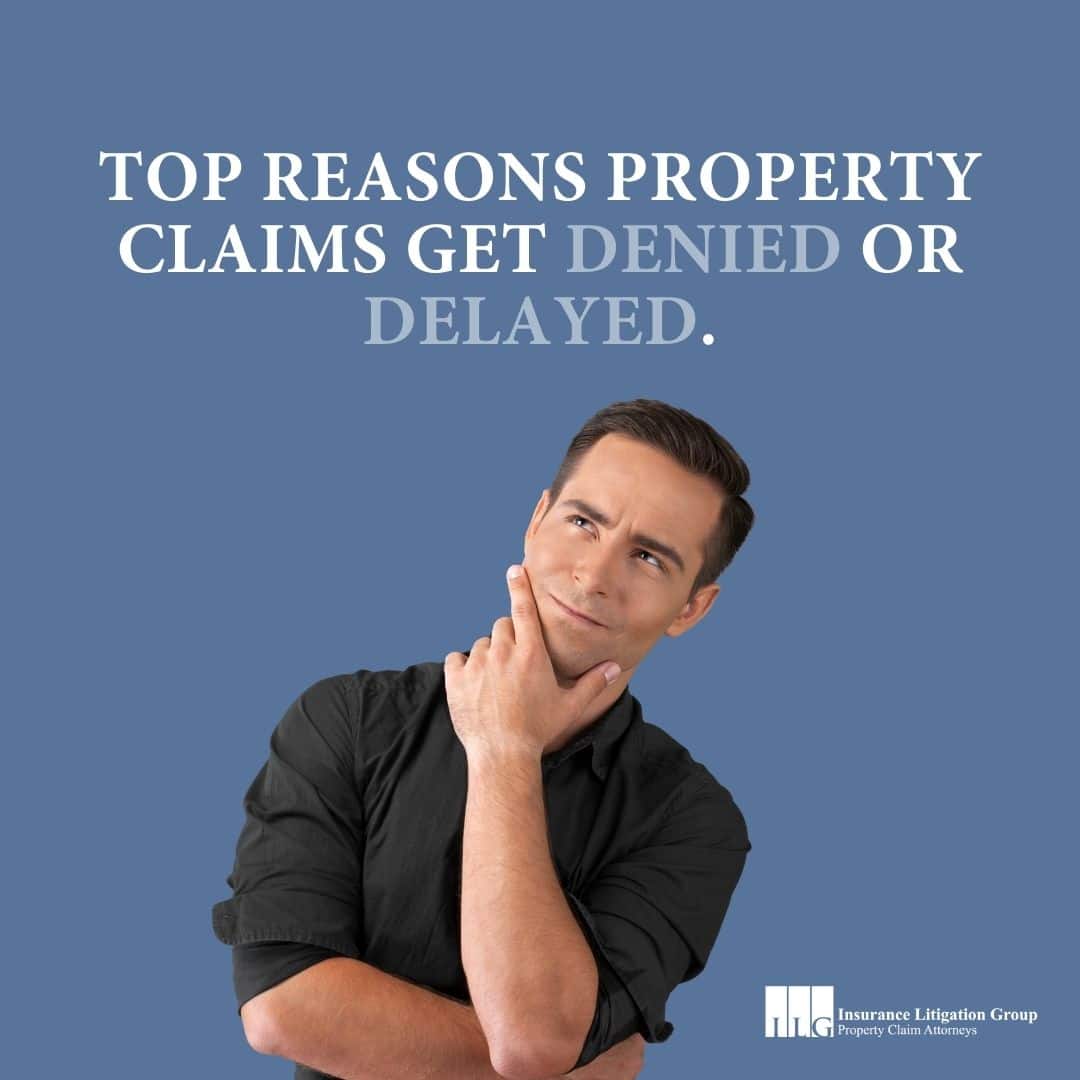Your property suffering from damage is already frustrating to deal with as it is, so the last thing you need is a denied or delayed property insurance claim on top of it all. We asked our expert property insurance claim attorneys to check their files and list the top reasons clients were denied or delayed by their property insurance company in Florida. From homeowners to AOBs, here’s what they found:
HOMEOWNERS
- The insurance company is going to argue for their own marketing and profitability. At the end of the day, the insurance company has the challenge of keeping rates low for their customers but to increase profits they have to raise insurance rates. But they’re not only raising rates, but they’re also blaming insurers for it and using it as their marketing piece: “We’re giving you low rates, but because you submitted too many claims, it’s your fault and we now need to raise your rates.” Not true. If they actually paid for the covered claims instead of denying and delaying, then there wouldn’t be this litigation in Florida and the insurance company would no longer be able to blame the consumer for driving up rates.
- Let’s talk Assignment of Benefits (AOB)… Your insurance company offers you different policies and premiums, ensuring you have the coverage you need. But if your policy doesn’t allow for an AOB, and that’s exactly what you need, then you’ll find yourself at a dead end. You want a policy that allows you to assign benefits to a contractor if you need it. If you’re not sure what an AOB is it’s an agreement that transfers all or some of the insurance claims benefits of the policy to a third-party, giving them the standing to file a claim and collect insurance payments without the involvement of the homeowner. So essentially, you’re paying for insurance that doesn’t help you nor allows you to receive the rightfully owed payment to fix your property.
- Sometimes claims are denied and/or delayed because of there’s a genuine legal question at issue. That means you have a poorly drafted policy. The way insurance companies draft policies makes it hard to determine if you actually have coverage. Thanks to their ambiguous language, the insurance company will now 1.) deny your claim 2.) blame you, the homeowner, for filing suits 3.) and ultimately, raise rates. If their own representatives can’t properly interpret what’s covered, then that’s a problem.
- Another reason, the insurance company will deny or delay your claim is late reporting. The longer you take to tell your insurance company there’s a problem, the more reason you give them to deny or delay your claim, as they’ll declare there wasn’t enough time for inspections to determine if it’s covered, so they’re prejudiced by the late reporting. While you may not be ready to file the claim, it’s always a best practice to document the damage, save broken parts, and report the damage to your insurance company as soon as you can determine if it’s a claim you should file. If you’re not sure if you should file a claim, you can call us to speak to one of our property claims experts.
- One of the insurance companies’ go-tos for denying claims is claiming damage was caused by wear and tear, caused by repeated leakage or seepage, or blaming your property damage on maintenance issues. While that reasoning may be valid in some cases, it doesn’t apply to all. For example, if your 30-year-old pipes burst in the wall and your insurance company blames it on wear and tear, there’s an issue. Not only are these pipes not visible where they can be “maintained,” but the insurance company knew how old the pipes were when they signed you up, accepted the risk and still took your money to insure you. Now, they want to blame you and say it’s “wear and tear?” No. You can’t maintain something you can’t see. Sudden and accidental occasions are supposed to be covered but that’s why they’ll always resort to this reason for denial, especially on older properties.
- Another reason your insurance company will deny your claim is by stating that the homeowner failed to mitigate damage. What does that mean? If something happens in your home, it’s your responsibility to stop it from getting worse. As a homeowner, you have an obligation to preserve the damage so the insurance company can see and inspect it. However, the keyword here is: Preserve. While it’s very hard to do this, it’s crucial that you do the best you can to temporarily fix the damage to preserve the scene so the insurance company can inspect the parts that broke. We recommend taking a lot of pictures and videos after reporting the damage to your insurance company.
- Last but certainly not least is roof wraps and roof tarps. When it comes to roof damage, you’re obligated to prevent damage from worsening under your policy (as mentioned above). The insurance company will say a roof wrap is not reasonable and necessary under your policy to protect your property from further damages and will suggest a blue tarp. However, with the Florida sun and weather, tarps don’t last very long and they are an unreliable way to prevent damages while your insurance company takes its time to determine coverage and pay for repairs.
AOBS
- Exceeds $3k cap. The $3k cap is only meant for Emergency Circumstances, for services provided to protect, repair, restore, or replace property or to mitigate against further damage to the property. IF the AOB is for Emergency Circumstances, the total amount cannot exceed $3,000 or 1% of Coverage A, whichever is larger. According to the statute, “the term “urgent or emergency circumstance” means a situation in which a loss to property, if not addressed immediately, will result in additional damage until measures are completed to prevent such damage.” Most AOBs are NOT emergencies under the statute’s definition, yet the insurance companies love to deny claims and tell Assignees of Benefits that they’ve exceeded the emergency cap, regardless of if it’s an emergency.
- AOB not submitted within 3 days. The insurance companies love to say an AOB is invalid because it was submitted more than 3 days after the AOB was signed or work began, however, they like to leave out the part of Florida Statute 627.7152(3) that clearly allows for late submissions of AOB documents, which would NOT invalidate an AOB.
- Insured claim denied/not covered. As an Assignee of Benefits, contractors stand in the shoes of the Insured. Coverage for the AOB depends on the reasons why a claim is denied. If the Insured fails to comply with post-loss obligations which leads to a denial of the claim, such as failure to submit a Sworn Proof of Loss or failure to appear at a Recorded Statement or Examination Under Oath, your portion of the claim also fails. If the insurance company denies the homeowner’s claim and can prove to a jury that damage was not caused by a covered peril, the AOB fails. If the claim is denied for something like wear and tear, you can most likely still pursue payment and a favorable coverage decision.
Has your property insurance claim been denied or delayed for the reasons listed above? Let our property claim experts take another look. Our experienced and aggressive attorneys take the time to analyze and interpret your policy and understand the full measure of damages available to you. We work with construction experts, restoration professionals and others to determine the facts. The insurance company has their experts… you should, too. We fight for you!




